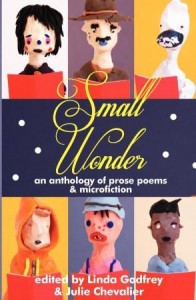 1. What inspired you to write the prose poem/microfiction which is published in Small Wonder?
1. What inspired you to write the prose poem/microfiction which is published in Small Wonder?
‘meds’ I wrote a few weeks after I began taking a medication for depression and anxiety.
‘refuse’ arose from some diary-like jottings in my notebook. It was begun many years ago and has been chipped away at, smoothed and roughed up again over time.
2.Tell us about that process. (Do you start sparse and widen out, or do you write down every possible association and cut back? Do you research the subject matter you are writing about? Is it pure intuition?) Take us through an example if you want.
When writing prose poems, I tend to put sentences together like building blocks. I like playing with permutations of sentences within a paragraph. It’s partly trial and error.
Both ‘meds’ and ‘refuse’ are attempts at paratactic writing (from Greek, parataxis, ‘placing side by side’) with narrative threads running through them. In other words, these poems were written as a series of discrete sentences, and the arrangement of sentences within a paragraph became a focal point of the writing/editing process. Sometimes I like to work against the grain of traditional storytelling or rhetorical conventions, and experiment with structuring paragraphs so that the ‘link’ between one sentence and the next is oblique or lateral. I’d like to think that both of these prose poems are mosaic-like, non-linear, cumulative.
I don’t intend for these poems to be cryptic (or at least, not like a cryptic crossword is cryptic). But maybe they’re crypt-like in the sense that they’re weird archives of body and mind.
3. What advice do you have for other writers ? about the first or last line? About how to choose the title? Do you follow any rules?
First and last lines can be ‘fetishised’ in various ways, and I suspect this influences the writing (and reading) process.
For instance, it could be remarked that the first line is an opening: a door, a portal, a gate, a window … an orifice of some kind? Or it could be said that the first line is sometimes the most deceptive line.
In all honesty, I’m probably a bit obsessed with opening lines.
As for last lines, well, let’s be a bit pretentious and say the last line is a death, a disappearing, a farewell, another dissolving of consciousness.
I have no set rules for titles. Sometimes the title comes first, sometimes last. Sometimes changing the title can transform a poem, shifting agendas, or perhaps shifting genders?!
4. Who or what inspires your writing?
So many people, so many things. Maybe if I had to give a one-word answer I’d say ‘interrelationships’. But that’s probably a bit of a cop-out.
Sometimes I write poems for friends, as gifts. I think there’s something worth contemplating in this notion of writing as a gift, an act of giving (or gifting). Though a poem can be just as much an act of taking … But if a poet writes a poem as a gift, perhaps it takes on elements of writing a letter or postcard to someone, or whispering in someone’s ear, or making them a pair of shoes, or compiling a mixtape.
Perhaps the poem is also received by the poet as a gift, or a series of gifts, and then the poet passes the gift(s) on. It is a spreading of gifts. Or who knows, in some cases, the spreading of a curse? (if you believe in curses). Certainly parts of the poetry scene could be described as a gift economy … there are probably a few curses circulating too …
5. Tell us what do you do if you haven’t written anything in a while and you want to get started writing again? Could you share your favourite writing exercise with our readers?
Grab a bunch of books from a bookshelf. Stack them in a pile. Then take the book that’s sitting at the top of the pile, and turn to a page at random. Write down the first word or phrase that hits you. Then place that book down, starting a second pile. Then take the next book from your original pile, turn to a page at random, write down the first word or phrase that hits you, then place the book on the second pile. Repeat until all the books from the first pile are now in the second pile. Check the words and phrases you’ve jotted down. Do any of them seem to link in interesting ways? Could some (or all) of these words and phrases spark a poem? Use these jottings as your starting point. If you get stuck, you can always work through your pile of books again, repeating the same process as before. Or choose some different books to ‘sample’ from if you like. You could try choosing books that might make for interesting juxtapositions, or choosing on the basis of the type of language or vocabulary they contain. Of course, feel free to modify any of your ‘sampled’ phrases to suit your poem. Gather, assemble, transform. Hopefully it’ll be the start of something.
